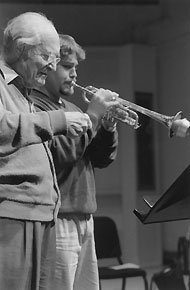BEFORE AMERICAN IDOL THERE WAS...
Your vote will hold the key.
It's up to you, tell us who
will be star of the day?
And this was how "Community Auditions" a local television broadcast in the 1960's from WBZ in Boston, Massachusetts began and ended. The show was hosted by week day radio celebrity Dave Maynard but on Sunday mornings, he was the man behind the original concept of American Idol. Okay, it wasn't national, in fact because this was before cable, the show only aired over a very small portion of New England. So how did it work?
First Dave and his crew would go out to local communities and have a talent search. I am not exactly sure how the winners were picked but at this level of the competition, the audience did not vote and you could not text message your favorite. The WBZ folks just picked a few singers, tap dancers, an occasional ventriloquist, and of course up and coming young musicians to journey to their studio for an on air competition that was shown Sunday mornings at 11:00 AM.
By the way, Dave had awesome studio musicians that could play any accompaniment you put in front of them. The show began with Dave singing the song and then along came the contestants to show their stuff. Everyone had a little pre-interview with Dave asking questions such as what you have prepared and how long you have been preparing for this day and then you strutted your stuff. Now here is where the real analogy to American Idol comes in. At the end of the program, each act did a 15-20 second reprise and Dave would ask you to vote - by post card - for your favorite. At this point, it really did not matter if you were the best, just as long as you had every person from your home town and all your family members loaded up with little white postcards and .8 cent stamps ready to barrage the address indicated on the screen. Two weeks later the winner was ask to return and do their act over, accept a $50 bond from WBZ and an invitation to the quarter finals. The quarter finals went to semi-finals and then finally a grand championship once a year. I believe the money was $250, $500 and $1000 for the champs. (Add a zero to each number to calculate the 2006 equivalent.)
How and why am I so qualified to write and discuss this piece of TV nostalgia? Well, these television appearances were at the very core of my road to becoming a professional trumpeter and performer. I appeared on Community Auditions numerous times, coming in third place on my first outing; winning on the "second chance" show and the quarter finals only to be eliminated in the semi finals when I was up against folks twice my age with years more experience. As I said, you could "rig" the results if you wanted to. I know that I had a cousin in Providence that sent in fifty postcards for me and I believe that my Mom sent in another fifty using various family names on ten each because she was son honest. By the way, I did all my appearances between the ripe old age of seven and nine years old and I believe that my two most popular songs were Georgie Girl and Fly Me to the Moon. They even did a where are they now? program when I was twelve or thirteen and I played a section of the Haydn Trumpet Concerto but it was only a showcase, no postcards please.
So don't you think that Simon should fork over some royalty money to Community Auditions? Sure you could debate a number of changes such as the not having the panel of judges or the fact that Idol is only open to singers but for me and my love of the trumpet, this was reality TV, 1960's style.

